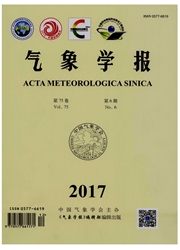

 中文摘要:
中文摘要:
实际大气既非完全是干空气,也不是处处达到饱和的湿空气,而是处于含有水汽但又不饱和的湿空气状态。基于这样一种湿大气状态,在湿大气中广义位温定义的基础上,对不同暴雨类型的广义位温与干大气的位温及饱和湿大气的相当位温做了比较。对2003年江淮流域暴雨过程、2004年华北一次暴雨过程以及2006年碧利斯台风中的位温、相当位温和广义位温分布的对比分析表明:即使是在暴雨系统中,湿空气的相对湿度也不一定达到100%,饱和湿空气相当位温的引入条件不能完全满足。而广义位温的定义用一个表达式就可以表示出于大气、未饱和湿大气以及饱和湿大气这3种大气状态的位温,位温和相当位温则是广义位温的特殊情况。当大气比湿为零时,广义位温就变成位温;当大气比湿达到饱和后,广义位温就变成相当位温。除了可以衔接干大气位温和饱和湿大气的相当位温外,广义位温包含了水汽由干到湿再到饱和的变化过程,更好地体现了大气中水汽的实际分布和变化特征。
 英文摘要:
英文摘要:
The real atmosphere is neither absolute dry nor saturated,it is moist but not saturated,and the generalized potential temperature (GPT) was thus introduced to describe this humid feature of the real moist atmosphere.Comparisons between the GPT in the moist atmosphere and the potential temperature(PT) in the dry atmosphere and the equivalent potential temperature(EPT) in the saturated moist atmosphere were done by analyzing three torrential rain cases occurred respectively over the Changjiang-Huaihe River Basins in 2003 and the north China in 2004 as well as during Typhoon Billis(2006) occurred in 2006.The results showed that the relative humidity is not up to 100%even in torrential rain and typhoon systems,and the saturated condition for defining the EPT is not met completely.The GPT can represent the PT for all of these three atmospheric statuses of dry air,unsaturated moist air and saturated moist atmosphere with the dry or saturated atmosphere being a special case of the GPT.When specific humidity is zero,the GPT becomes PT,and when the specific humidity is up to the saturated specific humidity,the GPT represents the EPT.In addition to linking the PT with the EPT,the GPT can describe the moist concentration and moist gradient better than the EPT.The GPT's definition included the process that the air changed from dry to moist,then up to saturated,and it can reflect a variety of processes of water vapor giving a better expression to the real moist atmosphere.
 同期刊论文项目
同期刊论文项目
 同项目期刊论文
同项目期刊论文
 期刊信息
期刊信息
